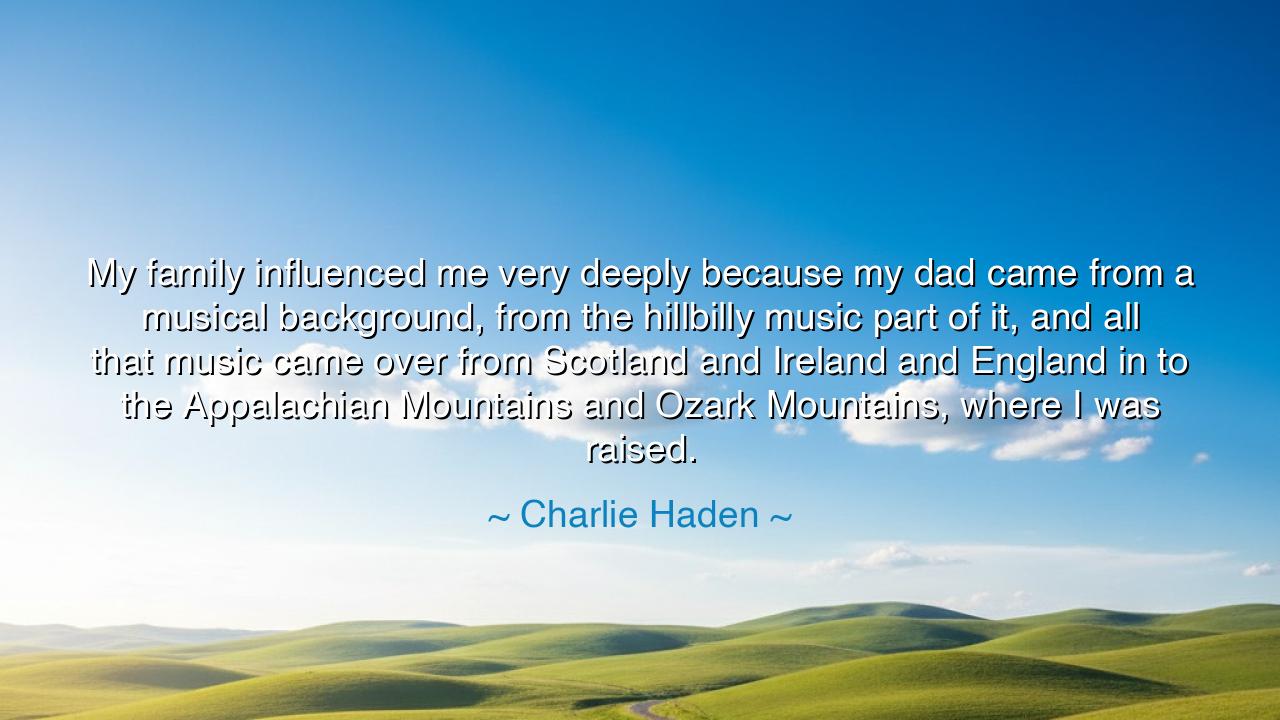
My family influenced me very deeply because my dad came from a
My family influenced me very deeply because my dad came from a musical background, from the hillbilly music part of it, and all that music came over from Scotland and Ireland and England in to the Appalachian Mountains and Ozark Mountains, where I was raised.






“My family influenced me very deeply, because my dad came from a musical background, from the hillbilly music part of it, and all that music came over from Scotland, Ireland, and England into the Appalachian Mountains and Ozark Mountains, where I was raised,” said Charlie Haden, one of the great souls of American music. These words, though spoken with humility, carry within them the echoes of centuries — the movement of peoples, the passing of melodies across oceans, and the deep truth that art is heritage made living. Through Haden’s reflection, we hear not only the story of a man but of a lineage, where song becomes the thread binding generations, lands, and hearts together.
In his voice, we feel the pulse of ancestral music, carried by those who journeyed from misty isles to new frontiers. The ballads of the Scottish Highlands, the laments of Ireland, and the folk tunes of old England found new soil in America’s wilderness. There, in the quiet hollows of the Appalachians, among the oak and the river mist, those songs were reborn. They mingled with hardship, hope, and the longing of the settlers who brought them, forming the roots of what we call folk and country music — melodies that tell of both exile and belonging.
Charlie Haden, born amid these traditions, inherited more than sound — he inherited story and spirit. His father’s “hillbilly” music was not a crude relic, as some might say, but a living bridge to the old world. It was the voice of a people who refused to let their history vanish. Haden’s musical journey, from his family’s radio show to the luminous world of jazz, was not a break from tradition but an evolution of it. His bass became an echo of that same longing — deep, resonant, and soulful, like the earth itself remembering its past.
Throughout the ages, the power of inheritance has shaped the greatest artists. Consider Beethoven, whose father’s cruel discipline drove him to wrest beauty from pain; or Bach, who carried forward generations of family musicians into the perfection of harmony. Just as rivers carve new paths but remain water from the same source, so too does every artist draw from unseen ancestors. Haden’s acknowledgment of his roots is a reminder that no greatness stands alone — it rises from heritage, humility, and continuity.
The Appalachian Mountains, where Haden grew, were not merely a landscape but a crucible of cultures. The songs sung by his family had journeyed for centuries, shaped by hunger, faith, and endurance. In every twang of the banjo, in every mournful fiddle line, lies the memory of distant lands — the green hills of Ireland, the winds of the Scottish moors, the hearth songs of English cottages. What his father played as “hillbilly” music was, in truth, a mosaic of history, each note a footprint of those who carried beauty through suffering.
There is profound wisdom in this: that the past is never truly gone if we listen closely. Haden did not reject his father’s music; he transformed it, infusing those ancient roots with the free spirit of jazz. In doing so, he wove together the old and the new, proving that tradition and innovation are not enemies, but partners in creation. The artist who forgets his origin loses his compass; the one who honors it discovers infinite horizons.
So, my child, learn from Charlie Haden’s truth: remember the song that raised you. Whatever your craft, your calling, or your dream — trace it back to the hands and hearts that shaped it. In every whisper of your ancestors, there lies guidance. To honor them is not to remain bound by their forms, but to let their music live anew through your own. Whether your inheritance is of music, words, or quiet strength, let it flow through you as through a vessel of the ages. For only by knowing where you come from can you truly know where you are meant to go — and in that harmony between past and present, you will find your own enduring melody.






AAdministratorAdministrator
Welcome, honored guests. Please leave a comment, we will respond soon